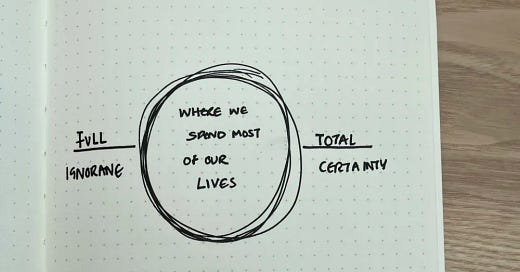'Nothing new happens in the known'
How you can learn to navigate uncertainty
Rethink is a newsletter for curious people who like to think differently. If you enjoy it, why not consider supporting it for as little as £1-per-week. I really value our Rethink community and all your support.
Dear Rethinkers,
This week’s newsletter is on something I’m worried about – that we’re becoming less tolerant of uncertainty. And our relationship with the unknown is something we should deeply value.
Last Friday, I tried an experiment. I tracked how many times throughout the day I was given a suggestion or recommendation by some device. I honestly stopped counting after I got to 125 by lunchtime!
My Fitbit pinged me with number of steps and reminders to move.
My email and text constantly made suggestions on the next word I should write.
Pop-up ads (everywhere) constantly made suggestions on what to buy.
Spotify made suggestions on what to listen to next.
My carefully curated Instagram feed even told me what ‘job’ I should do in the garden today! I stopped here.
A deluge of endless suggestions on what to write, buy, listen, and do next. Wow, there is a lot of money being made on apps promising some kind of certainty!
Helpful? Sometimes. But do all these recommendations make me feel more prepared, more confident, or less anxious? No! They seem to be having the reverse effect on what the French call l’inconnu – the unknowable.
So why does this deeply worry me? We’re becoming increasingly susceptible to promises of certainty. It’s an easy side of us to manipulate because thinking we know everything gives us the illusion of control. The human response to any kind of uncertainty is to control it.
Eroding our ‘trust mindset’
When we outsource a human capability to a technology – it erodes that capacity in ourselves. For example, can you remember phone numbers anymore? I can’t even remember my husband’s! My kids don’t know how to read a map because of GPS. It’s known as the ‘automation paradox’. The more we lean on technology to ‘control’ uncertainty and come up with the answers the more we will lose that capacity ourselves.
It’s eroding what I call our ‘trust mindset’ – our capacity to confidently navigate the unknown.
Embracing the unknown
Physicist Carlo Rovello points out that most of our lives are spent “between full ignorance and total certainty.” Most of life, whether it’s a job, a project, a relationship, or our health, is spent in the vast intermediate space – the unknown. Don’t let your smartphone convince you otherwise.
Believe me, as someone who has struggled with the worries and anxiety uncertainty can bring, I used to hate this idea. But turning the unknown into something to be curious about and explore is the antidote to worry and fear. Every new insight, creative idea, or meaningful change came after an unknowing phase. As another physicist, Richard Feynman (yes, physicists seem to be very insightful on uncertainty), puts it:
“In order to make progress, one must leave the door to the unknown ajar.”
I’m someone who will read the last page of a book at the start. I like to know how most things will end…at the beginning! I’ve learned how not to run from uncertainty by constantly reminding myself of this:
Nothing new happens in the known.
What are your thoughts on uncertainty? Please leave below:
Warmly,
MORE FROM RETHINK WITH RACHEL
I’ve recently gone back to school to study at Kew Gardens. It’s an identity itch I’ve been needing to scratch for a long time. The most important learning has been just how hard it is to be a beginner as an adult.
It is uncomfortable and confronting.
Learning how to just explore again is hard.
Unlearning how not to focus on the outcome (or the grade) is a challenge.
It’s been a big mindset shift to move from a day job driven by speed and efficiency, into a ‘beginner’s mind’ where it’s important to trust the journey rather than fixate on the outcome. READ MORE BELOW.









Certainly, we as human have the characteristic of always trying to control everything as independent individuals and owners of our own life and actions. That characteristic lead to a sense of rewarding when tick boxes are marked but more occasionally ends up in frustration and false expectative. These inner emotions become a loop in our life and affects overall mental health and confidence to navigate that sea of uncertainty which is the future.
I love this quote from James Clear: "Don’t feel qualified? Nobody does.
You can only be qualified to do that which you have already accomplished or trained for.
Anything new is accomplished by unqualified people."